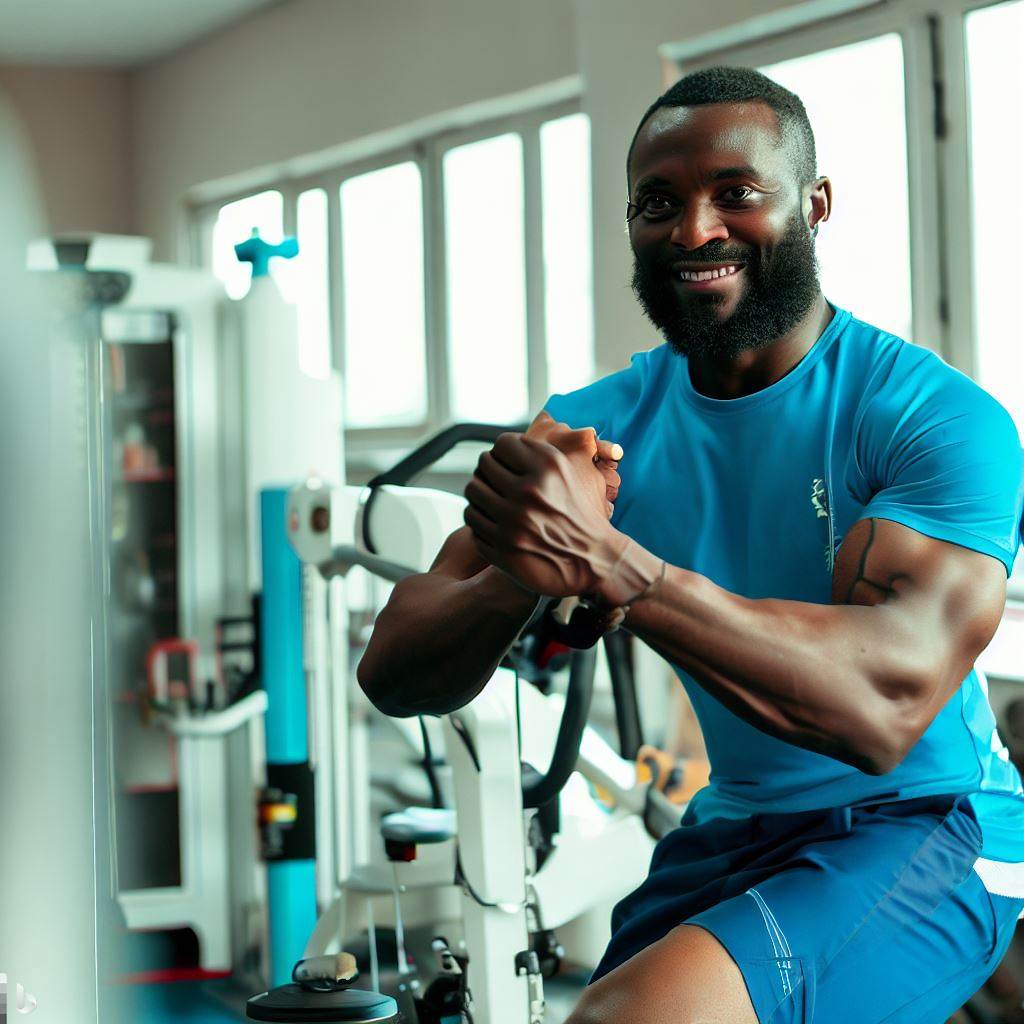Introduction
The typical life and day of a Nigerian exercise physiologist is both rewarding and challenging. They are dedicated professionals who tirelessly help individuals improve their overall well-being.
Their responsibilities include designing personalized exercise programs, conducting fitness assessments, and monitoring clients’ progress. They educate and motivate their clients to adopt healthy lifestyle habits to achieve their fitness goals.
Amidst the rewards, they face challenges such as limited resources and societal misconceptions about exercise. Nevertheless, their passion for promoting health drives them forward.
In a nutshell, the life of a Nigerian exercise physiologist involves making a positive impact on people’s lives by guiding them towards a healthier future. Their commitment and expertise contribute significantly to building a healthier nation.
In this blog post, we’ll explore the life of a Nigerian exercise physiologist, focusing on their vital role in enhancing physical health.
Education and Qualifications
To become an exercise physiologist in Nigeria, there are specific educational requirements and certifications that need to be fulfilled:
- Educational Requirements: It’s important to obtain a Bachelor’s degree in Exercise Science, Physiology, or related field. Some universities may require specific prerequisite courses such as anatomy, physiology, and biochemistry.
You will also need to participate in internships or clinical placements to gain practical experience.
- Certifications and Licensures: After completing the degree, aspiring exercise physiologists should pursue additional certifications to enhance their credentials.
One of the most prominent certifications in Nigeria is the Certified Exercise Physiologist (CEP) offered by the Nigerian Association of Exercise and Sport Science (NAESS).
The CEP certification involves passing an examination conducted by NAESS and demonstrating competence in various exercise assessment and prescription techniques. Upon obtaining the CEP certification, exercise physiologists can legally practice and promote exercise therapy in Nigeria.
A solid foundation in exercise science and physiology is crucial for Nigerian exercise physiologists due to the nature of their work.
The minimum educational requirement is a Bachelor’s degree, providing theoretical knowledge in human anatomy, physiology, exercise prescription, biomechanics, and sports nutrition.
Internships and clinical placements are vital for hands-on experience, allowing students to apply their knowledge in real-life settings under supervision.
Obtaining the CEP certification offered by NAESS is highly recommended, as it demonstrates competency in exercise assessment and prescription for various populations.
With the CEP certification, exercise physiologists can practice legally in Nigeria, enhance credibility, and increase employability. Clients and employers trust certified exercise physiologists for quality care and services.
In short, the life of a Nigerian exercise physiologist involves completing a Bachelor’s degree and obtaining the CEP certification. These qualifications equip them with the knowledge and skills to positively impact individuals’ health and well-being in Nigeria.
Work Environment and Schedule
Being an exercise physiologist in Nigeria comes with its unique work environment and schedule. Here’s a look into the typical day in the life of a Nigerian exercise physiologist:
Work Environment
The work environment for a Nigerian exercise physiologist can vary depending on the setting. Some exercise physiologists work in hospitals, while others work in private clinics or fitness centers.
In hospitals, exercise physiologists often collaborate with medical professionals and work as part of a healthcare team. Private clinics and fitness centers provide a more specialized setting for exercise physiologists to work with clients.
Transform Your Career in Nigeria
Discover unmatched expertise with our personalized Career Consulting service. Navigate Nigeria’s job market with a strategy tailored just for you.
Get StartedThe work environment can be fast-paced, requiring excellent communication and interpersonal skills. Exercise physiologists may spend a significant amount of time standing, walking, and demonstrating exercises to clients.
They are also responsible for maintaining equipment and ensuring a safe and clean environment for clients.
Working Hours and Variations
The usual working hours for a Nigerian exercise physiologist are Monday to Friday, from 9:00 AM to 5:00 PM. However, there can be variations in the working hours depending on the specific workplace.
Some exercise physiologists may have flexible schedules, including evening or weekend shifts. In hospitals, exercise physiologists may be required to work on weekends or be on call for emergencies.
Private clinics and fitness centers often offer extended hours to accommodate clients’ needs. Exercise physiologists may need to adjust their schedules to accommodate individual client appointments.
Traveling to different locations or client homes may also be required, especially for those in private practice.
It’s important for Nigerian exercise physiologists to be adaptable and organized to manage their work schedules effectively.
Overall, being an exercise physiologist in Nigeria provides diverse work environments and flexible working hours, allowing professionals to make a positive impact in promoting fitness and well-being.
Read: Exercise Physiology: The Intersection of Fitness and Medicine in Nigeria
Daily Responsibilities
A Nigerian exercise physiologist plays a pivotal role in promoting health and well-being, with a diverse range of tasks and responsibilities.
Here is an overview of their daily activities:
- Conducting Fitness Assessments: Using various tests and measurements, exercise physiologists evaluate individuals’ fitness levels to gain insights into their physical condition.
- Designing Personalized Exercise Programs: Based on the fitness assessment results, they create tailored exercise programs that address the specific needs and goals of each individual.
- Guiding Clients During Exercise Sessions: Exercise physiologists supervise and monitor clients’ exercise sessions to ensure they maintain proper form and technique, minimizing the risk of injuries.
- Providing Nutritional Advice: They offer valuable guidance on proper nutrition to optimize clients’ performance and help them achieve their desired outcomes.
- Conducting Health Screenings: Health screenings are performed to identify any underlying health conditions that may influence exercise recommendations.
- Monitoring Vital Signs: Exercise physiologists assess and monitor clients’ heart rate, blood pressure, and other vital signs before, during, and after exercise sessions to ensure safety and effectiveness.
- Educating Clients: These professionals educate clients about the benefits of exercise, injury prevention, and the importance of maintaining an active lifestyle, empowering them to take charge of their health.
- Supervising Cardiac Rehabilitation Programs: Exercise physiologists oversee specialized programs designed to support patients recovering from heart-related conditions.
- Conducting Research: Some exercise physiologists engage in research activities to contribute to the scientific understanding of exercise and its effects on the body, promoting evidence-based practices.
- Collaborating with Healthcare Professionals: They work closely with physicians, physical therapists, and other healthcare providers to ensure comprehensive care for clients, fostering a holistic approach to health.
Specific Assessments Conducted
- Treadmill Stress Tests: To evaluate cardiovascular fitness and identify potential risks or abnormalities.
- Body Composition Analysis: Utilizing advanced tools like bioelectrical impedance analysis to assess body fat percentage, muscle mass, and overall body composition.
These examinations aid in customizing exercise programs and tracking progress over time, enabling exercise physiologists to make necessary adjustments for optimal results.
Therefore, the life of a Nigerian exercise physiologist is filled with diverse and impactful responsibilities. Their expertise and guidance empower individuals to lead healthier lives through proper exercise and lifestyle choices.
Read: The Role of Exercise Physiology in Nigeria’s Sports Industry
Your Unique Story, Perfectly Told
Don't let your dream job slip away with a generic resume. We craft personalized resumes and cover letters that highlight your unique strengths, making you unforgettable to Nigerian employers.
Get Hired
Challenges and Opportunities
Challenges Faced by Nigerian Exercise Physiologists
- Lack of awareness and understanding among the general population about the importance of exercise physiology.
- Inadequate funding and resources for research and development in the field.
- Limited job opportunities and financial instability for exercise physiologists.
- Difficulty in accessing advanced technologies and equipment for accurate assessment and analysis.
- Insufficient collaboration and networking opportunities with other healthcare professionals.
- Inconsistent government policies and regulations regarding exercise physiology.
- Cultural barriers and misconceptions about exercise and physical activity in Nigerian society.
Unique Opportunities and Advancements in the Field
Despite the challenges faced by Nigerian exercise physiologists, there are also unique opportunities and advancements in the field that provide hope for the future.
With increased awareness about the importance of physical activity and the role of exercise in preventing and managing chronic diseases, the demand for exercise physiologists is expected to grow.
Furthermore, the emergence of specialized training programs and collaboration with other healthcare professionals can enhance the credibility and effectiveness of exercise physiology as a profession.
Technological advancements also play a crucial role in improving assessment and analysis, enabling exercise physiologists to provide personalized and evidence-based exercise prescriptions.
Overall, while there are challenges to overcome, Nigerian exercise physiologists have promising opportunities to make a significant impact on public health and well-being in the country.
Read: Unveiling the Doctor Profession in Nigeria: An Insightful Look
Real-Life Story: A Day in the Life of a Nigerian Exercise Physiologist
Meet Aisha Hassan, a passionate Nigerian exercise physiologist making a difference in people’s lives. Let’s dive into a typical day in her exciting profession.
Morning Routine:
- 6:00 AM: Aisha starts her day with a refreshing workout of her own, setting an example for her clients.
- 7:00 AM: After a quick shower and breakfast, she heads to her workplace, the Energy Fit Fitness Center.
Workplace and Interactions:
- 8:00 AM: Aisha arrives at the fitness center, greets her colleagues, and prepares for the day.
- 8:15 AM: She meets with her clients, conducting assessments to determine their fitness levels and personalized workout plans.
- 9:00 AM: Aisha leads group exercise classes, inspiring participants to push their limits and achieve their fitness goals.
- 10:00 AM: During a break, Aisha collaborates with nutritionists and physical therapists to ensure comprehensive care for her clients.
Tasks Performed:
- 11:00 AM: Aisha conducts individual training sessions, guiding clients through exercises and monitoring their progress.
- 12:00 PM: Lunchtime! Aisha refuels with a balanced meal, energizing herself for the rest of the day.
- 1:00 PM: She reviews research articles, staying up-to-date with the latest advancements in exercise physiology.
- 2:00 PM: Aisha conducts workshops and educational sessions for fitness enthusiasts, spreading awareness about the importance of exercise.
Afternoon Tasks:
- 3:00 PM: Aisha meets with new clients, discussing their health history and developing tailored exercise programs.
- 4:00 PM: She explores innovative workout techniques, incorporating them into her clients’ routines for added variety and challenge.
- 5:00 PM: Aisha provides rehabilitation exercises for clients recovering from injuries, helping them regain strength and mobility.
- 6:00 PM: As the day winds down, Aisha answers emails and messages from clients, addressing their concerns and offering guidance.
Evening and Personal Time:
- 7:00 PM: Aisha ends her workday, bidding farewell to her colleagues and leaving the fitness center.
- 7:30 PM: Back home, Aisha enjoys a healthy dinner, cherishing some well-deserved personal time with her family.
- 9:00 PM: She spends time reading exercise science journals, further enhancing her expertise and knowledge.
- 10:00 PM: Aisha unwinds with a calming yoga session, preparing her mind and body for a restful night of sleep.
A day in the life of a Nigerian exercise physiologist like Aisha is undoubtedly busy but extremely fulfilling. She not only supports clients in achieving their fitness goals but also promotes healthier lifestyles within the community.
Through her dedication and expertise, she is making notable contributions to the field of exercise physiology in Nigeria.
Read: Future Outlook: The Nutritionist Profession in Nigeria by 2030
Impact on Health and Well-being
Exercise physiologists play a crucial role in improving the health and well-being of individuals in Nigeria. Through their expertise and interventions, they contribute to positive outcomes and success stories.
Let’s delve into some examples and highlight their impact.
Chronic Disease Management
Exercise physiologists excel in managing various chronic conditions such as diabetes, heart disease, and hypertension. By prescribing tailored exercise programs, they help individuals improve their cardiovascular health, reduce blood pressure levels, and enhance glycemic control.
Weight Loss and Obesity Prevention
Nigeria, like many countries, faces a growing obesity problem. Exercise physiologists actively work in weight loss programs, providing fitness assessments, personalized exercise plans, and ongoing support.
Transform Your LinkedIn Presence
Don't let your LinkedIn profile blend into the crowd. We uniquely craft profiles that showcase your professional story, making Nigerian recruiters take notice like never before.
Stand OutTheir interventions promote weight reduction, body fat loss, and overall physical fitness.
Rehabilitation and Injury Prevention
In collaboration with healthcare teams, exercise physiologists aid in the recovery of patients who have suffered injuries or undergone surgeries.
They design rehabilitation programs that address specific needs, ensure a safe recovery, and prevent future injuries through targeted exercises and functional training.
Mental Health Promotion
Exercise has proven benefits for mental health, and exercise physiologists incorporate this knowledge into their practices.
They design exercise programs that help manage stress, anxiety, and depression. These interventions elevate mood, boost self-esteem, and enhance overall psychological well-being.
Aging and Seniors’ Fitness
Exercise physiologists cater to the unique needs of older adults, promoting healthy aging and independent living. They develop exercise routines to enhance strength, flexibility, and balance, reducing the risk of falls and maintaining functional abilities.
Workplace Wellness Programs
In corporate settings, exercise physiologists contribute to the establishment of workplace wellness programs.
They conduct fitness assessments, lead employee exercise routines, and provide education on healthy lifestyle habits. These initiatives improve employee productivity, reduce absenteeism, and foster a positive work environment.
Sport Performance Enhancement
Exercise physiologists also work with athletes, providing specialized training to enhance performance and prevent injuries.
They analyze movement mechanics, assess fitness levels, and prescribe strength and conditioning exercises specific to each sport. This expertise helps athletes excel in their chosen disciplines.
These examples of success stories and positive outcomes showcase the significant impact exercise physiologists have on health and well-being in Nigeria.
Their contributions are commendable, transforming lives and communities. By implementing evidence-based interventions, they empower individuals to take control of their health and make positive lifestyle choices.
In essence, exercise physiologists in Nigeria positively influence health and well-being through various domains. Their expertise spans chronic disease management, weight loss, rehabilitation, mental health promotion, aging fitness, workplace wellness, and sports performance enhancement.
These professionals are instrumental in improving the lives of individuals and making a meaningful impact on society as a whole.
Read: Decoding the Skillset of a Successful Cardiovascular Technologist
Importance of Exercise Physiology in Nigeria
Exercise physiology plays a significant role in the Nigerian healthcare system and contributes to preventive medicine and public health in various ways.
- Promoting Active Lifestyles: Exercise physiologists encourage individuals to adopt and maintain active lifestyles through regular physical activity.
- Preventing Chronic Diseases: Regular exercise helps prevent and manage chronic diseases such as obesity, diabetes, and cardiovascular disorders.
- Enhancing Mental Health: Physical activity has proven benefits in improving mental health, reducing stress, and alleviating symptoms of depression and anxiety.
- Improving Physical Fitness: Exercise physiologists assess individuals’ fitness levels and design exercise programs to improve strength, endurance, flexibility, and overall physical fitness.
- Rehabilitating Injuries: Exercise physiology plays a crucial role in the rehabilitation of individuals recovering from injuries or surgeries, helping them regain strength and function.
- Managing Weight: Exercise physiologists assist individuals in achieving healthy weight management through exercise programs tailored to their specific needs.
- Increasing Longevity: Regular physical activity, guided by exercise physiologists, can contribute to increased life expectancy and overall quality of life.
- Promoting Healthy Aging: Exercise physiology helps older adults maintain their independence, mobility, and cognitive function as they age.
- Educating Healthcare Professionals: Exercise physiologists provide education and training to healthcare professionals, ensuring they understand the importance of exercise in healthcare.
- Advocating for Health Policies: Exercise physiologists play a role in advocating for policies that promote physical activity and exercise as part of preventive medicine and public health initiatives.
Exercise physiology in Nigeria holds immense importance due to the country’s rising burden of non-communicable diseases, sedentary lifestyles, and inadequate physical activity levels.
Therefore, exercise physiology contributes significantly to the Nigerian healthcare system by promoting active lifestyles, preventing chronic diseases, and improving mental health.
Exercise physiologists play a crucial role in preventive medicine and public health, enhancing physical fitness, managing weight, rehabilitating injuries, and advocating for health policies.
By recognizing the importance of exercise physiology, Nigeria can improve its population’s health and well-being.
Read: Top Institutions to Study Phlebotomy in Nigeria
Career Outlook and Future Trends
In Nigeria, the life of an exercise physiologist is filled with promising career prospects and abundant opportunities. The field is continuously evolving, driven by emerging trends and advancements that shape their professional journey.
As more people recognize the significance of physical fitness in preventing and managing chronic diseases like diabetes, hypertension, and obesity, the need for specialized professionals in exercise physiology has grown.
Nigerian exercise physiologists have become essential members of healthcare teams, collaborating closely with physicians, nutritionists, and physical therapists in hospitals, clinics, and rehabilitation centers.
Their role involves designing personalized exercise programs tailored to individual needs, conducting fitness assessments, and offering guidance on nutrition and lifestyle modifications.
Beyond traditional healthcare settings, exercise physiologists find opportunities in sports performance centers, corporate wellness programs, and fitness facilities.
The field of exercise physiology is dynamic, characterized by constant advancements and emerging trends. Technological innovations have significantly impacted their work, with wearable fitness trackers and mobile applications enabling better monitoring of vital signs, physical activity levels, and health-related data.
Exercise physiologists now recognize the significance of addressing psychological barriers and motivations to create lasting lifestyle changes.
To succeed in this ever-changing landscape, Nigerian exercise physiologists must remain updated with the latest research and advancements.
Continuing education and professional development opportunities are crucial for staying competitive and making a significant impact on the health and well-being of the Nigerian population.
In short, the life of a Nigerian exercise physiologist is promising and multifaceted. The field offers diverse opportunities for growth, driven by emerging trends like wearable technology, virtual reality, and behavioral psychology integration.
Embracing these advancements and constantly updating their knowledge and skills allows them to thrive and positively influence the lives of many in Nigeria.
Read: Occupational Therapy Schools: Where to Study in Nigeria
Find Out More: Rising to the Challenge: Role of Psychiatry in Nigeria’s Health
Conclusion
To summarize, this blog post highlighted a day in the life of a Nigerian exercise physiologist. We discussed their role in promoting physical activity and improving health outcomes in Nigeria.
We explored how exercise physiologists assess and prescribe exercise programs tailored to individual needs, with a focus on preventing and managing chronic diseases.
Additionally, we discussed the importance of continuous professional development and the challenges they face in a resource-constrained environment.
Despite these challenges, exercise physiologists play a vital role in Nigeria’s health sector. Their expertise and dedication contribute to improving the overall well-being of individuals in the country.
By implementing evidence-based exercise interventions, they have the potential to reduce the burden of non-communicable diseases and improve the quality of life for many Nigerians.
In conclusion, exercise physiologists in Nigeria work diligently to promote physical activity and advocate for better health outcomes in the country.
Their contribution is invaluable, and with continued support and recognition, they can make a lasting impact on the health of Nigerians.




